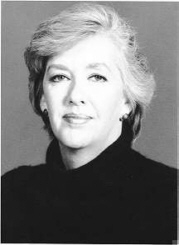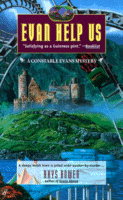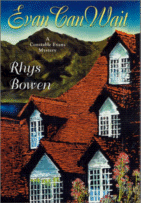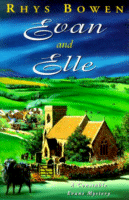A Conversation With Rhys Bowen
by Claire E. White
Popular mystery author Rhys Bowen was born in England, although her mother's family comes

|
Rhys grew up in Bath, England and went to school and college in England, Austria and Germany. After completing her degree she went to work with the BBC in London, finding her niche in the drama department, where she was inspired to write her first play, "Dandelion Hours". It was followed by several other radio and TV plays before the urge for sunshine drove her to work in Australia. Taking up an offer from Australian broadcasting, she went to work in Sydney, where she met her future husband, a fellow Englishman. The couple moved to San Francisco in 1966, and have lived there ever since.
Finding nothing like the BBC existed in the Pacific Northwest, she had to turn to other directions for her creative outlets. She began writing children's picture books under her married name, Janet Quin-Harkin. Her first book won several awards and established her in a new career. Children's books, young adult books, adult historical romances and sagas followed, until she decided it was finally time for her to write what the kind of books that she enjoyed reading most: mysteries, the kind of mystery that gives the reader a great sense of time and place as well as a rattling good story.
Feeling that too many books had been written about San Francisco, she cast about looking for the perfect setting for her new mystery series when she realized that the villages where she spent all those childhood summers spent with relatives in North Wales would make a great setting for a mystery series. The battling ministers, the postman who read the mail, the overwhelming landlady all existed in a village very like Llanfair. For this new venture her agent and editor suggested that she use another name, as it is so different from her other writing. She chose her Welsh grandfather's name, Rhys Bowen, and the Constable Evans Evans mystery series was born.
Evan Can Wait is the fifth entry in the Evans Evans series, following Evan Help Us, Evan Can Wait, Evanly Choirs, and Evan and Elle. In Evan Can Wait, a horde of documentary film producers descend upon Llanfair to film the raising of a sunken World War II aircraft. When the obnoxious producer Grantley Smith is found murdered at the bottom of an old mine shaft which was used during the Blitz to store valuable paintings from the National Gallery, Constable Evan has his hands full trying to find a murderer.
Rhys talked with us about her new book, Evan Can Wait, her move from popular children's author to mystery novelist, and gives some great tips for aspiring novelists.
What did you like to read when you were growing up?
Mostly fantasy and adventure mysteries like the Famous Five. It was always children running off on their own, camping on deserted islands etc -- things I'd never be allowed to do.
What led up to the publication of your first children's book?
I had been working in BBC drama and had written some plays for them. I got married and came to San Francisco where nothing like the BBC existed. I tried my hand at a children's book. It was accepted and won quite a few awards which got me started on a long career writing for children and young adults.
What did you enjoy most about writing children's books?
When I wrote picture books I liked the silliness. Later when I wrote for young adults, most of my books were funny. I like tackling any situation, even tragedy, with humor. Also I like the fact that most children's books have some kind of resolution and happy ending. What I didn't like was writing so many of them and feeling that I was trapped on a teenage treadmill.
How did the Constable Evans mystery series come into being? What prompted you to turn from writing children's books to writing mysteries?

|
Let's talk about Evan Evans himself. How did you create him? Were there any specific characteristics or personality traits that you definitely tried to avoid ?
I don't think I have ever "created" a character in my life. Characters just come
| "It's a scary proposition to start a book without knowing exactly where it's going. Every time I begin, I'm terrified I won't be able to finish. But by halfway through I'm excited and can't wait to get to the end." |
The Evan Evans books are known for their dialogue and their wonderful sense of humor. How did you develop your ear for dialogue?
I began my professional writing career by writing radio plays. This was a wonderful apprenticeship. On radio the dialogue is all you've got. I would always read everything out loud. That way you hear any sentence that sounds clumsy, or false. I still read a lot of my stuff out loud as I'm working.
How important is having a good sense of humor to you?
Very important, but it's not something you can learn or improve. You're either born with a sense of humor or not. I found when writing my teenage books that there is humor in almost any situation. However when I'm writing my mysteries, I'm very careful not to joke about the actual killing. Murder is always a serious subject to me.
I'd like to talk about your latest book, Evan Can Wait, which has a fascinating subplot about paintings from the National Gallery in London being stored in a slate mine in Wales during World War II. What was your inspiration for this story?

|
Evan seems a bit torn -- part of him loves the life of a small-time constable, but another part of him seems to long to be a detective in the big city. Will we be seeing more of this dilemma in future books?
Absolutely. I didn't want him to be static. Real life people are always evolving and growing. Now that he has thoughts of maybe settling down, he realizes he can't be content with his present role forever. Also he'd like his accomplishments to be noticed a little more than they have been. He has come to realize that life in Llanfair might be idyllic, but it can't last forever.
The book utilizes an interesting format: the main narrative is interspersed with the journal entries of Trefor Thomas, which parallels the main story and provides tantalizing clues as to what is happening in the present day murder investigation. What made you use this journal approach for the first time?
When I first decided to bring in Trefor Thomas's journal, it was in the second half of the book, just to give us some background about the storing of the paintings in the slate mine. But the moment I let him tell his story, I realized that his story was more interesting than the main plot, so I let him start at the beginning. I hadn't expected him to take over the book, though! It wasn't until I read through the finished book that I realized how very closely the two stories parallel each other. This whole creation was very exciting for me. It's the first time I have ever written a book not really knowing what was going to happen next.
If you were casting Constable Evans in a film, and you could cast any actor you wanted, who would you cast?
I have a clear picture of him in my mind. It would have to be a native Welsh actor. Ieuan Griffudd might do, but he isn't really beefy enough. I need a Welsh rugby player who can act!
Let's talk about the creative process of writing. When starting a new book, do you outline the plot first? Do you always know who the murderer is when you start the book?
When I wrote YA books, I used to outline first. I find this doesn't work with mysteries. If I plan too far ahead, the whole plot becomes sterile. I need to put people together at the beginning of the book, watch them interact and let one of them get killed. Then I need to uncover whodunit at the same speed Evan does. I think I know who the murderer is when I start the book. I do know who is going to get killed and probably why. I haven't always been right in who the murderer was.
It's a scary proposition to start a book without knowing exactly where it's going. Every time I begin, I'm terrified I won't be able to finish. But by halfway through I'm excited and can't wait to get to the end.
One of the greatest challenges in writing a series is keeping the stories and characters fresh: something with which you never seem to have a problem. Are there any tips or tricks you can share about keeping it new?
Keep coming up with good stories. Never resort to stock behaviors and above all, throw the characters a punch below the belt every now and then. I have Evan and Bronwen's romance having developed nicely for four books. Then someone from Bronwen's past turns up in this book and throws Evan's life into confusion. The reader should never know what to expect.
The Constable Evans series is also loved for its wonderful glimpse inside the life of a Welsh village. The inclusion of the Welsh glossary is quite helpful. Do you speak Welsh fluently?
I wouldn't say fluently. I understand quite a bit and I sound very authentic because I heard it spoken to me as a child. My vocabulary and grammar are sadly lacking, though. I'm trying to catch up in my spare time. Ideally, I'd like to take one of the intensive courses they offer now in Wales.
As a little girl, what did you enjoy most about your visits to Wales?
The mountains, for one. I fell in love with mountains the moment I saw one. It must be in the blood. My great aunt's cooking -- she is the inspiration for Mrs. Williams and the best cook I have ever met. Also the fact that life was so different. Time didn't matter.
A theme that shows up in the books is the Welsh antipathy for the English. Is that still true in Wales today?
Definitely. It always will be there to some degree. Wales has been occupied by a foreign power since the thirteenth century. Naturally there is hostility. However in most cases it's limited to good natured teasing. There is also a radical fringe who would like to see Wales as a separate nation and are willing to take radical measures (the burning of holiday homes, which happens in my book Evan and Elle, for example). Most people are pretty content with the way things are today -- Wales now has a separate assembly and England provides a big source of tourism!
What is your writing process like? Take us through a typical writing day for you.
When I'm working on a book I rarely take a day off. I get down to the computer
| "Write what you really want to, not what you think will sell. If there is passion in what you are writing, it will find an audience." |
Did you have a writing mentor? Who inspired you when you were growing up? Who inspires you today?
I have been writing all my life, but I've always been very private about it. I hate showing my work to anyone while it's in progress. I'd be terrible in a critique group. If someone suggested a change, I'd convince myself that the book was doomed to failure. However I have a large circle of mystery-writing friends who are willing to share tips and experiences, do joint signings and make the promotion process fun.
How have you changed as a writer since your first book was published?
I've gotten better at it! It's like a potter manipulating clay. If you do it for long enough, you can make the kind of pot you pictured, every time. It's the same for me, manipulating words. I find I've never suffered from writer's block. I always have way too many ideas. I'm always sure that the latest idea is the best I've ever had. So I've also become more disciplined as I've gone along. I make myself stick to one book until it's finished.
What is your advice to aspiring mystery writers?
Write what you really want to, not what you think will sell. If there is passion in what you are writing, it will find an audience. However, it doesn't hurt to read everything you can. See what kind of books are winning the Edgar these days. Get involved with the mystery community. Join Sisters in Crime or Mystery Writers of America. Too much effort is wasted if you spend a year writing a book that is too close to a bestselling series.
How much do you use the Internet? Has the Internet affected your writing life?

|
The Internet also keeps me in touch with writing friends around the world. I have expanded my circle of friends by hundreds.
When you're not writing, what are some of your favorite ways to relax?
I love to travel. My husband and I take several trips each year. Last year we spent two months in Australia. I love hiking with my friends and we sometimes take trips together. I play tennis. I sing in a choir and have taken voice lessons, and I like to read mysteries and travel books! Oh, and I also like playing with my one year old granddaughter and grandson!
Return to the February 2001 issue of The IWJ.
More from Writers Write
